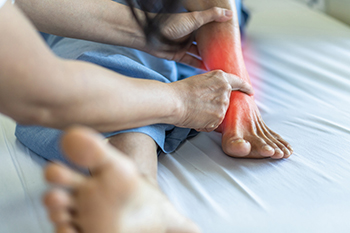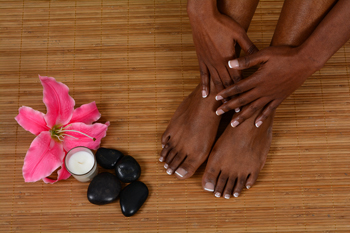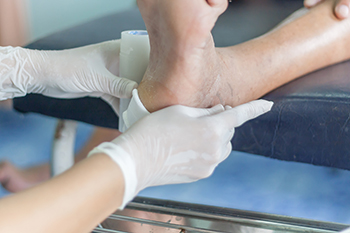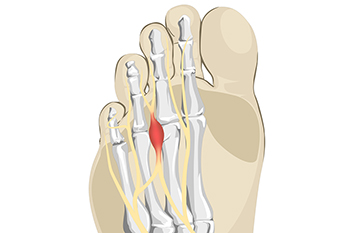

A broken ankle, involving a fracture of the bones in the lower leg above the foot, can result from various stresses on the ankle joint, often due to accidents or injuries. This may include rolling the ankle, twisting it, or sustaining significant force, such as landing heavily from a height. Determining whether the ankle is sprained or broken can be challenging, as both can be painful. Common signs of an ankle injury or fracture include pain, swelling, bruising, and deformity. A broken ankle is typically very painful, especially when bearing weight. Treatment for a broken ankle varies based on the type and severity of the fracture. It often involves immobilization using a boot or cast to allow for healing, along with non-weight bearing using crutches. More severe cases may require surgical intervention. After immobilization, the ankle can be left weak, stiff, and still painful. Exercises will then be needed to aid full recovery. If you suspect a broken ankle, it is suggested that you make an appointment with a podiatrist for a proper diagnosis and treatment.
Broken ankles need immediate treatment. If you are seeking treatment, contact Dr. Harris L. Klear from Burlington County Podiatry Associates. Our doctor can provide the care you need to keep you pain-free and on your feet.
Broken Ankles
A broken ankle is experienced when a person fractures their tibia or fibula in the lower leg and ankle area. Both of these bones are attached at the bottom of the leg and combine to form what we know to be our ankle.
When a physician is referring to a break of the ankle, he or she is usually referring to a break in the area where the tibia and fibula are joined to create our ankle joint. Ankles are more prone to fractures because the ankle is an area that suffers a lot of pressure and stress. There are some obvious signs when a person experiences a fractured ankle, and the following symptoms may be present.
Symptoms of a Fractured Ankle
If you suspect an ankle fracture, it is recommended to seek treatment as soon as possible. The sooner you have your podiatrist diagnose the fracture, the quicker you’ll be on the way towards recovery.
If you have any questions, please feel free to contact one of our offices located in Marlton and Delran, NJ . We offer the newest diagnostic and treatment technologies for all your foot care needs.

Ankle pain can be a persistent and debilitating issue that affects individuals of all ages and lifestyles. This discomfort often stems from a variety of factors, such as injuries resulting from accidents or sports-related activities, overuse, improper footwear, or underlying medical conditions. Understanding the root cause of ankle pain is crucial for implementing effective remedies. Resting and elevating the affected foot can provide initial relief by reducing inflammation while promoting healing. Gentle stretching and strengthening exercises under the guidance of a podiatrist can aid in rehabilitation and prevent future issues. Wearing supportive footwear with proper arch and ankle support, in addition to orthotic inserts, can provide stability and alleviate pain. It is suggested that you seek timely medical advice from a podiatrist if you have ankle pain, who can effectively diagnose and treat this condition.
Ankle pain can have many different causes and the pain may potentially be serious. If you have ankle pain, consult with Dr. Harris L. Klear from Burlington County Podiatry Associates. Our doctor will assess your condition and provide you with quality foot and ankle treatment.
Ankle pain is any condition that causes pain in the ankle. Due to the fact that the ankle consists of tendons, muscles, bones, and ligaments, ankle pain can come from a number of different conditions.
Causes
The most common causes of ankle pain include:
Symptoms
Symptoms of ankle injury vary based upon the condition. Pain may include general pain and discomfort, swelling, aching, redness, bruising, burning or stabbing sensations, and/or loss of sensation.
Diagnosis
Due to the wide variety of potential causes of ankle pain, podiatrists will utilize a number of different methods to properly diagnose ankle pain. This can include asking for personal and family medical histories and of any recent injuries. Further diagnosis may include sensation tests, a physical examination, and potentially x-rays or other imaging tests.
Treatment
Just as the range of causes varies widely, so do treatments. Some more common treatments are rest, ice packs, keeping pressure off the foot, orthotics and braces, medication for inflammation and pain, and surgery.
If you have any questions, please feel free to contact one of our offices located in Marlton and Delran, NJ . We offer the newest diagnostic and treatment technologies for all your foot care needs.

Your feet are vital for your overall well-being and maintaining an active lifestyle. Neglecting foot care can lead to various problems, making it essential to establish a healthy foot care routine. Proper foot care is particularly crucial for individuals with diabetes to prevent complications. To start, regularly clean, dry, and moisturize your feet. Examine them for infections and trim toenails carefully. Choose comfortable shoes that fit well and avoid wearing high heels for prolonged times. Establish a daily foot care routine, pay attention to symptoms, and seek timely treatment for common foot problems. These can include athlete's foot, nail fungus, warts, blisters, corns, calluses, and bunions. If you would like to know more about foot care essentials or are experiencing a problem with your feet, it is suggested that you make an appointment with a podiatrist to obtain expert advice for everything related to the feet and ankles.
Everyday foot care is very important to prevent infection and other foot ailments. If you need your feet checked, contact Dr. Harris L. Klear from Burlington County Podiatry Associates. Our doctor can provide the care you need to keep you pain-free and on your feet.
Everyday Foot Care
Often, people take care of their bodies, face and hair more so than they do for their feet. But the feet are a very important aspect of our bodies, and one that we should pay more attention to. Without our feet, we would not be able to perform most daily tasks.
It is best to check your feet regularly to make sure there are no new bruises or cuts that you may not have noticed before. For dry feet, moisturizer can easily be a remedy and can be applied as often as necessary to the affected areas. Wearing shoes that fit well can also help you maintain good foot health, as well as making it easier to walk and do daily activities without the stress or pain of ill-fitting shoes, high heels, or even flip flops. Wearing clean socks with closed shoes is important to ensure that sweat and bacteria do not accumulate within the shoe. Clean socks help to prevent Athlete’s foot, fungi problems, bad odors, and can absorb sweat.
If you have any questions please feel free to contact one of our offices located in Marlton and Delran, NJ . We offer the newest diagnostic and treatment technologies for all your foot and ankle needs.

Pressure injuries on the heel bone, also called heel pressure ulcers, result from prolonged pressure and friction. The heel is the second most common site for such injuries due to its small area bearing the weight of the lower extremities. People with immobility, diabetes, leg spasms, or impaired blood flow are more susceptible to these injuries, affecting their quality of life. Prevention and healing involve alleviating pressure by using supportive devices. Such injuries can lead to open wounds, blisters, or deep tissue damage, increasing the risk of infection. Treatment options include pressure relief, proper wound care, specialized cushioning or boots, and, in severe cases, surgery. Due to the complexity and potential complications of such foot wounds, if you suffer from this, it is suggested that you make an appointment with a podiatrist for care.
Wound care is an important part in dealing with diabetes. If you have diabetes and a foot wound or would like more information about wound care for diabetics, consult with Dr. Harris L. Klear from Burlington County Podiatry Associates. Our doctor will assess your condition and provide you with quality foot and ankle treatment.
What Is Wound Care?
Wound care is the practice of taking proper care of a wound. This can range from the smallest to the largest of wounds. While everyone can benefit from proper wound care, it is much more important for diabetics. Diabetics often suffer from poor blood circulation which causes wounds to heal much slower than they would in a non-diabetic.
What Is the Importance of Wound Care?
While it may not seem apparent with small ulcers on the foot, for diabetics, any size ulcer can become infected. Diabetics often also suffer from neuropathy, or nerve loss. This means they might not even feel when they have an ulcer on their foot. If the wound becomes severely infected, amputation may be necessary. Therefore, it is of the upmost importance to properly care for any and all foot wounds.
How to Care for Wounds
The best way to care for foot wounds is to prevent them. For diabetics, this means daily inspections of the feet for any signs of abnormalities or ulcers. It is also recommended to see a podiatrist several times a year for a foot inspection. If you do have an ulcer, run the wound under water to clear dirt from the wound; then apply antibiotic ointment to the wound and cover with a bandage. Bandages should be changed daily and keeping pressure off the wound is smart. It is advised to see a podiatrist, who can keep an eye on it.
If you have any questions, please feel free to contact one of our offices located in Marlton and Delran, NJ . We offer the newest diagnostic and treatment technologies for all your foot care needs.

Morton’s neuroma is a thickening of the tissue that surrounds the digital nerve that leads to the toes. It is commonly experienced between the third and fourth toes and can feel as if there is a small pebble in your shoe. A Morton’s neuroma also may be termed an interdigital neuroma, interdigital neuritis, or a plantar neuron. The main symptom is sharp and burning pain in the ball of the foot, especially while walking or running. Some numbness or tingling may also be present. High-heeled shoes, which increase pressure on the ball of the foot, may make the situation worse. Tight or narrow shoes that squeeze the toes can also contribute to the discomfort. Treatments for Morton’s neuroma include changes in footwear, wearing inserts in the shoes, injections of corticosteroid medication, and shockwave therapy. In severe cases, surgery to remove part of the affected nerve or surrounding tissue may be considered. If you are experiencing pain that may be caused by Morton’s neuroma, it is suggested that you make an appointment with a podiatrist.
Morton’s neuroma is a very uncomfortable condition to live with. If you think you have Morton’s neuroma, contact Dr. Harris L. Klear of Burlington County Podiatry Associates. Our doctor will attend to all of your foot care needs and answer any of your related questions.
Morton’s Neuroma
Morton's neuroma is a painful foot condition that commonly affects the areas between the second and third or third and fourth toe, although other areas of the foot are also susceptible. Morton’s neuroma is caused by an inflamed nerve in the foot that is being squeezed and aggravated by surrounding bones.
What Increases the Chances of Having Morton’s Neuroma?
Morton’s neuroma is a very treatable condition. Orthotics and shoe inserts can often be used to alleviate the pain on the forefront of the feet. In more severe cases, corticosteroids can also be prescribed. In order to figure out the best treatment for your neuroma, it’s recommended to seek the care of a podiatrist who can diagnose your condition and provide different treatment options.
If you have any questions, please feel free to contact one of our offices located in Marlton and Delran, NJ . We offer the newest diagnostic and treatment technologies for all your foot care needs.